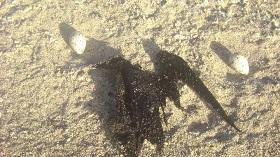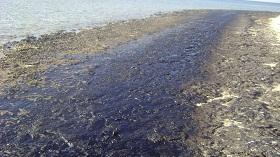Using AI to control energy for indoor agriculture
30 September 2024
Published online 14 July 2010

Environmental groups in Egypt are alleging that an oil spill in the Red Sea last month off the coast of Egypt was due to a faulty oil rig, but the government denies the allegations, shifting the blame to other parties.
The oil spill will probably not have lasting damages on the touristic beaches there, but the environmental impact on surface sea life may be more serious than first thought.
Officials from the Ministry of Environmental Affairs and Ministry of Petroleum in Egypt claim the oil spill, first seen washing up on the shores in June 16, is now completely under control.
"So far, 90% of the touristic beaches have been cleaned. Unfortunately, the Northern Islands protected area, which was heavily impacted by the oil spill, has not been cleaned yet," said a spokesperson from Hurghada Environmental Protection and Conservation Association (HEPCA), an environmental non-government organization, who asked to remain anonymous due to pressure from some government agencies.
Press officers at the Ministry of Environmental Affairs were contacted by Nature Middle East but refused to comment on the status of cleanup efforts in the protectorate area.
The Northern Islands are a collection of 22 islands, which are some of the most pristine and abundant waters of the Red Sea. They are home to over 200 species of corals and around 800 species of fish, as well as hosting rich habitats that include mangroves and sea-grass beds.
"Three of the islands, Al-Ashraaf, Al-Towal and Dahr Al-Towal, are the worst affected by the oil spill," said Wahid Salama, general manager of the Natural Protectorates of the Red Sea sector at the Ministry of Environmental Affairs in Egypt. The islands are a key nursing grounds for certain endangered species, such as the hawksbill turtle.
"Animals that must use the surface are at direct risk of oil contamination if they cannot or do not avoid surface slicks," explains Michael Berumen, assistant professor of marine science and engineering at the Red Sea Research Centre in the King Abdullah University of Science and Technology (KAUST). "Sea turtles and mammals, such as dolphins, must come to the surface to breathe. They risk inhaling harmful chemicals or physical obstruction of breathing.

"There are very few studies on the effects [of oil spills], but I do know some that found effects 3-4 years later," said Berumen.
"We found many dead birds covered with oil on the shores of the affected islands," said our HEPCA source.
Salama explains it is impossible to estimate the actual full cost of the spill at this stage.
"Cleanup costs can be estimated, of course, but the 'cost' of lost services, such as decreased fisheries output, is hard to put numbers on," added Berumen. "There are also potential flow-on effects. For example, if tourism decreases because of the decreased 'quality' of reefs, then there are real dollars lost in the local economy."
HEPCA says the spill came from an oil rig approximately fifty nautical miles north of the touristic town of Hurghada. Egypt's Ministry of Petroleum, however, denies the oil spilled from a seaside rig. They say it was either leaked from one of the tankers passing through the Gulf of Suez as they cleaned their engines, or from old oil deposits on the shores that melted due to a severe heat wave that hit Egypt at the same time the oil started to show up on the beaches.
HEPCA insists the oil came from a leaking oil rig. "We have a sample from the oil we found on the shores, and our experts say it is crude oil. It cannot be from a passing ship. And the heat cannot have melted the deposits, no matter how high it was."
Cleaning of the affected islands is set to start, but the process is slow and tedious. According to Salama the cleaning operation will be by hand, as no heavy machinery is allowed into the protectorate due to the delicate nature of the islands.
doi:10.1038/nmiddleeast.2010.175
Stay connected: